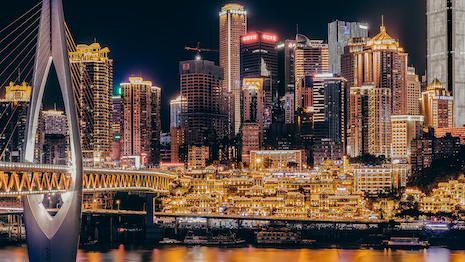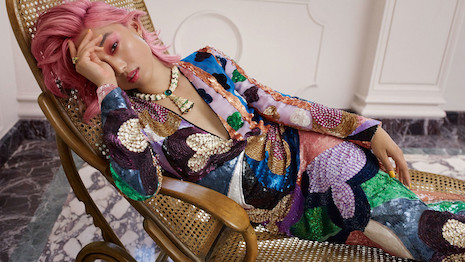- About
- Subscribe Now
- New York,
February 6, 2020

 China's wealth is reflected in the proliferation of cities of glass and steel, such as Chongqing, with a rapidly urbanizing population. Image courtesy of Reuter Communications
China's wealth is reflected in the proliferation of cities of glass and steel, such as Chongqing, with a rapidly urbanizing population. Image courtesy of Reuter Communications
Luxury brands that want to appeal to affluent Chinese consumers over the next decade will need to be tech savvy, deliver Chinese-focused messaging and understand the evolving tastes of sophisticated Chinese consumers.
A new report from Reuter Communications revealed that China’s elite class is now creating its own definition of luxury and these conspicuous consumers are no longer letting Western ideals decide their tastes. Moreover, the meaning of luxury in China is shifting as more Chinese tastemakers are influencing luxury brands to appeal to their desires.
“The rules and definitions are no longer being set by Western ideals,” said Vanessa Wu, director for Europe at Reuter Communications, Shanghai. "Millions of newly affluent Chinese consumers are redefining the very notion of what luxury means, and brands must respond now.
“Definitions in China are continually evolving," she said. "A combination of Chinese becoming more confident in their figurative luxury shoes and many millions of freshly urbanized Chinese consumers being new to luxury means that the old rules are out, and new Asian tastes are in.”
Reuter Communications is a luxury marketing agency based in Shanghai.
Competitive advantage
What China – currently in the midst of the coronavirus epidemic – has is sheer clout in terms of its purchasing power and patterns.
The country is the world’s leading gold consumer for the sixth year and will soon dominate fashion and beauty consumption.
Additionally, Chinese travelers will make up a quarter of all global outbound travel by 2030.
Last year, more than 20,000 foreign brands from 77 countries and regions sold products through Tmall Global, Alibaba’s portal that allows retailers and brands without a China-based entity to sell to Chinese consumers.
 Chinese travelers are seeking more adventure-oriented vacation experiences. Image courtesy of Reuter Communications
Chinese travelers are seeking more adventure-oriented vacation experiences. Image courtesy of Reuter Communications
Chinese consumers are hungry for these high-end products, but are looking to be marketed to in original Chinese-centric ways.
Luxury brands that will win in the future will create China-specific messaging that is not simply taking creative served up in other regions and putting a local spin on it.
No, these affluent shoppers are beginning to expect China-first messaging to go along with Chinese expert staff, agencies, creatives and influencers.
It will not be enough to hire one Chinese influencer and call it a day. Brands will have to really embrace Chinese culture in their marketing.
These companies will also show an awareness that China is a massive country, home to a variety of different people and cultures, and nuance their services as such.
“Hyper-regionalism is an inevitability – the sheer size of China means that culture, language and dialect, history, cuisine and life varies greatly from region to region,” Ms. Wu said.
“Each region has the population of a large European country," she said. "Regional campaigns that go beyond localizing to China and step toward localizing for regions, provinces and cities show cultural respect and tactical nuance.”
 Chinese Gen Z consumers are rapidly shaping consumption behavior of fashion products and luxury services. Image courtesy of Reuter Communications
Chinese Gen Z consumers are rapidly shaping consumption behavior of fashion products and luxury services. Image courtesy of Reuter Communications
Interconnectivity and sustainability
Affluent Chinese consumers are mobile-first digital natives and it is imperative that brands that want to appeal to this audience keep up.
As technology evolves, so too does the consumer experience, which will become much more transparent in the future.
For instance, shoppers will be able to use technology to try on products rather than having to visit a store in person or even order something online and then return it.
Luxury brands that fail to deliver this type of instant access could become obsolete, according to the findings in the Reuter Communications report.
Additionally, just as mobile technology facilitates more seamless registrations and passwords into fingerprints, facial and voice recognition, expect new enhancements to support hands-free and device-free integration.
Technology will evolve to integrate physical spaces, for instance, and luxury retailers will be expected to be early adopters.
Another key trend that will play out in the next decade is the focus on sustainability.
While luxury buyers are not expecting every single transaction to save the planet, the conversation surrounding environmental awareness is growing globally. Affluent Chinese consumers are listening.
Luxury brands that act responsibly and sustainably will appeal to consumers who are looking at how their individual actions can help the planet in positive ways.
AT ITS CORE, knowing what makes the Chinese consumer tick is key.
“In a new world of re-defined luxury, think outside the box, but don’t guess outside the box,” Ms. Wu said.
“More than ever, comprehensive research is needed to discover the unexpected cross-overs and unpredictable collaborations that your new luxury target audience would be inspired by,” she said.
“If the new luxury consumers don’t have a standardized luxury wish-list, then a brand needs to re-invent the way it strategizes for its customer’s preferences.”
Share your thoughts. Click here